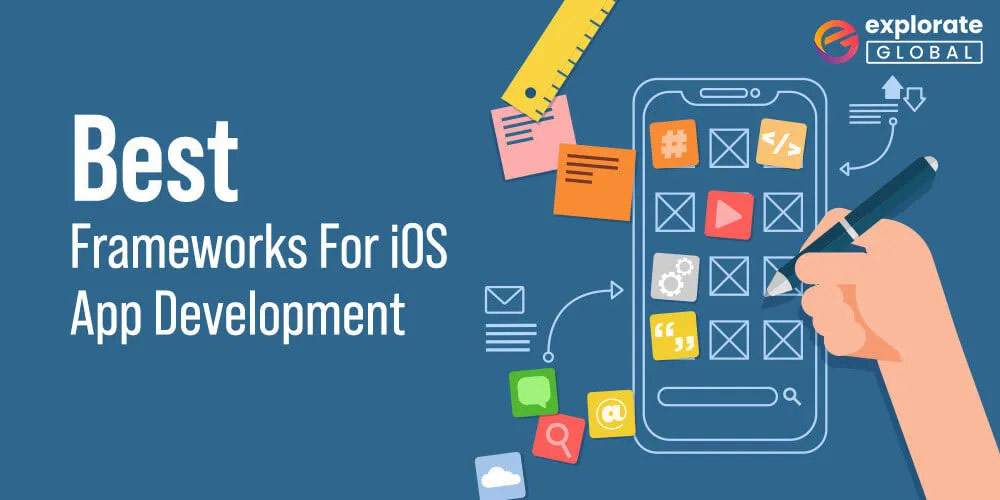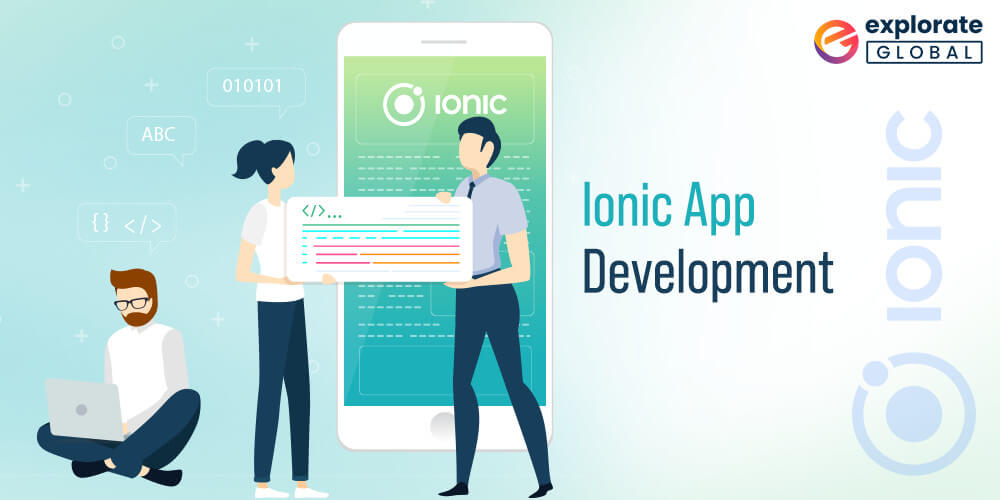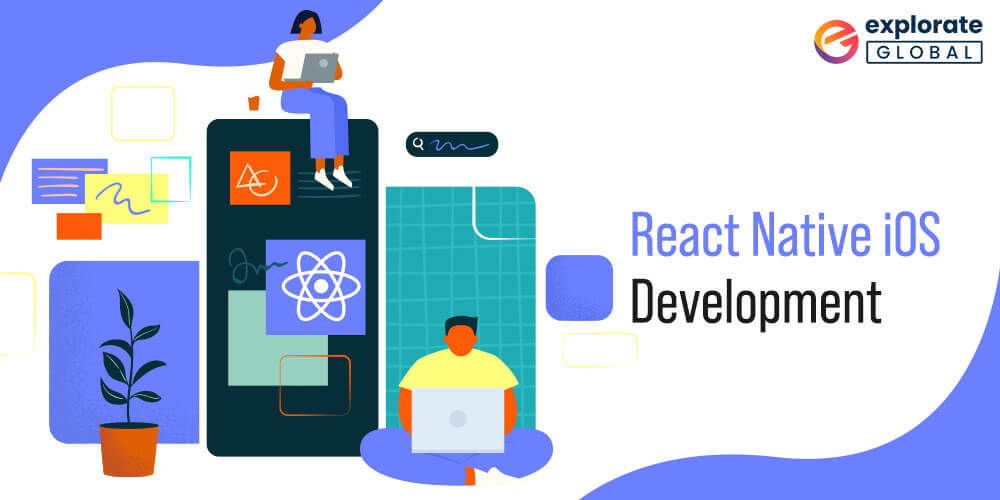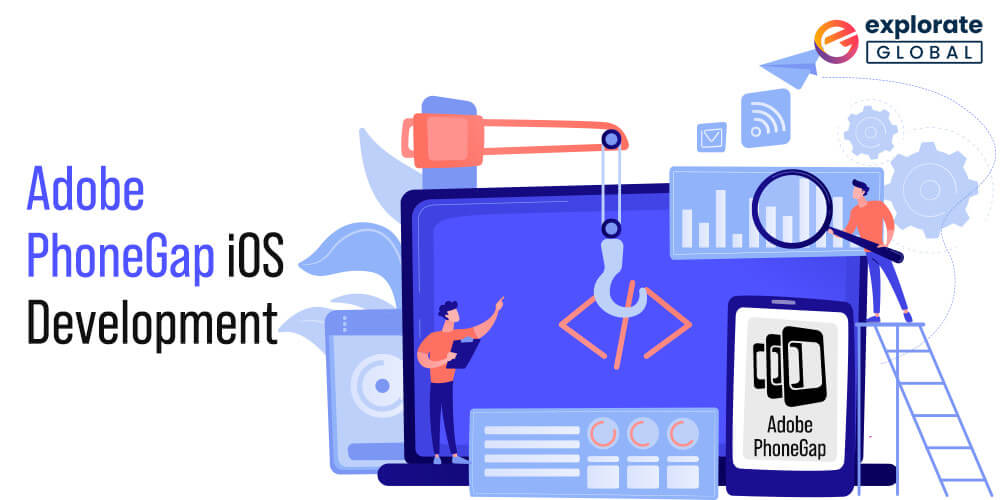
Mobile applications have already been assimilated into our daily lives. You only have to take out your cell phone and search for the appropriate mobile apps if you want to go on a trip, purchase a movie ticket, or digitally communicate with your loved ones. Everything is at your fingertips now thanks to a number of cutting-edge mobile applications. A mobile device’s value drops without mobile apps. What would the majority of people do without our preferred smartphone apps, after all?
Mobile applications assist us in carrying out our daily tasks as well as providing entertainment. But have you ever wondered how these amazing mobile applications that make our lives easier are created? Even technical consumers are unaware of the technology and concept that enable mobile apps, despite the fact that everyone uses them. Mobile app development frameworks serve as the fundamental building blocks for all fantastic iOS and Android applications.
With each year, more people are using iOS applications. There are many opportunities to attract across the iOS platform with approximately 100 million iPhone users in the United States alone. The mobile app development framework, often known as a software development framework, is where realizing that promise begins.
These iOS development frameworks give iOS app developers the ability to create applications using a variety of supporting components. These elements include toolkits, various code libraries, debuggers, and a number of interfaces. Any MacOS application starts with an iOS development framework. Now more than ever, picking the best iOS development framework for your apps is essential. We’ve compiled the top 8 iOS development frameworks for mobile app development below to aid in your decision-making. Let’s look at it.
Top 9 frameworks for iOS app development
1. Ionic App Development

Ionic is an Angular and Apache Cordova-based HTML5 mobile application development framework that enables programmers to create apps for the Android, iOS, and Windows platforms. Cross-platform mobile application development is done with it for slick mobile performance. Because they can employ a variety of standard UI components including filters, action sheets, forms, tab bars, list views, and an intuitive navigation menu directly in the design, iOS app developers adore the Ionic framework. This enables teams to concentrate on the business of creating apps instead of thinking about UI elements.
The Ionic Framework appears to be far easier to use than comparable iOS development frameworks for any developer who is acquainted with CSS, JavaScript, or HTML. The Ionic framework may also handle mobile applications on iOS and Android devices. Ionic is consistently regarded as the top iOS framework among all other iOS app development frameworks because of its out-of-the-box features. Some of the Ionic features are:
- built-in UI elements
- quicker time for development
- 5 million developers in an evergreen, powerful, and stable iOS development framework
- complete command over the creation of apps
2. Sencha Ext JS – iOS Development Framework
Sencha Ext JS is the new name for what was once known as Sencha when it was combined with Ext JS. Flexibility is essential in an iOS development framework. Ext JS enables iOS programmers to create a variety of both complicated and simpler apps because it supports HTML 5 and JavaScript. It includes a wide variety of widgets, such as toolbars, forms, menus, and lists, among numerous other capabilities, in contrast to similar iOS programming frameworks. Sencha Test, one of its great products, may assist you in testing your application across platforms as well as browsers.
ExtJS can be used to create mobile frameworks for iOS devices as well as Windows and Android applications. The ability to seamlessly integrate with other APIs allows you to combine many APIs with a specific goal to get the best results. This JavaScript programming framework can be used to create data-intensive online and mobile applications. With more than 115 pre-integrated, high-performing UI components, it is a cross-platform framework. A pivot grid, HTML5 calendar, grids, a D3 adaptor, trees, forms, lists, menus, windows, panels, etc. are a few of the components. Additionally, Sencha has almost a thousand user extensions. Some of the features of Sencha Ext JS include:
- Organize a lot of data
- strong analytics
- flexible structure for the layout
- visualisation of data
- Package for Advanced Data-Driven Documents (D3)
You Might Like: Top 7 iOS App Development Trends
3. React Native iOS Development

The best iOS development framework for iOS in 2019 was React Native, and it is likely to continue to be the best in the coming years. React Native is the framework of choice for all iOS app developers. Developers can concentrate on building high-performance apps quickly using the React Native app development platform, which enables quicker deployment times and quick returns on investments. Development teams do not need to learn excessively difficult programming languages that are generally used to create iOS apps because the app works using JSX.
Additionally, due to the speedy conversion of the code into native representations before execution, React Native is renowned for offering simple animations. It comes with the top JavaScript library for creating native apps for all platforms and gadgets. You can create powerful and efficient applications for iOS and Android using React Native. Additionally, it enables the development of platform-specific variations of a number of components, making it simple to use a single codebase across various platforms. Facebook introduced this user-driven JS library in 2018. Several React Native features include:
- recycled materials
- plugins from third parties that work
- Predictive UI using declarative API
- both the iOS as well as Android platforms are supported
Keep reading A complete guide on React Native Development
4. Flutter iOS Development
Flutter is an iOS programming framework that was created by Google that attracts developers’ attention by enabling quicker coding procedures. Since a single code base is supplied for both the Android and iOS frameworks, leveraging for quicker coding is seen to be more appropriate for the creation of mobile apps.
In contrast to previous programs, Flutter’s key advantage is its ability to easily and cleanly transition outdated widgets into new widgets. This makes it easier to create quickly engaging mobile applications that are extremely responsive. This UI toolkit is equipped with fully configurable widgets, which facilitate the rapid development of native applications. The layered architecture of Flutter also ensures that components render more quickly. Some of the outstanding features of the Flutter app development framework are:
- Integrated material design
- Integrated Cupertino (iOS-style) widgets
- Motion-rich APIs
- supports the platforms of iOS and Android
- dependable widget support
- a high-performance program
Keep reading A complete guide on Flutter App Development
5. Adobe PhoneGap iOS Development

The name Adobe is well-known to the majority of people. Their iOS development framework provides outstanding performance across many devices, just like their other software products. iOS developers can easily deliver a well-developed, functional application using the Adobe PhoneGap development framework. You can choose to create apps for Blackberry, Android, Windows, Mac OS, and Firefox OS regardless of whether you only use the iOS framework architecture.
Multiple developers can collaborate on a single project with the help of an easily accessible feature. It also comes with a technology called Hydration that shortens the time needed to finish a program while also making the last update procedure simpler. This best mobile app development framework makes use of CSS3, HTML5, and JavaScript to create cross-platform apps. Several characteristics of Adobe PhoneGap include:
- Flexibility
- Open-Source
- Compatible on all the platforms
- Faster development process
- Ease of Development
- Strong Backend
Keep Reading: A Complete Guide to PhoneGap Development
6. Swiftic iOS Development Framework
Swiftic is one best iOS development frameworks featured with an easily navigable interface. Since all of Swiftic’s plans provide a 30-day money-back guarantee, using it is a convenient option. Additionally, it provides a 6-month success guarantee program. The six-month service is cost-free if you don’t see any effects from it. Its simple user interface, professional advice, and approach are designed for beginners making it one of the most flexible frameworks for developing iOS apps. Numerous technical developments, like push notifications, social network feeds, app advertising, etc., are included in this iOS-integrated framework. You can create, publish, and grow your mobile app from a single control panel, which is a really practical alternative. Some of the key characteristics include:
- Outstanding push notification
- Use a loyalty card to establish yourself as a devoted customer.
- Create your mobile store.
- In-app coupons
- Simple Customer Engagement and App Promotion
- Feeds on social media
- Publication Support for Apps
- Advanced Analytics Integration with Third Parties
7. Xamarin iOS Development Framework
Due to its solitary shared codebase and fully integrated apps, Xamarin is swiftly rising to the top among mobile app frameworks. The C# programming language, which is supported by the platform, can help to improve the quality of the application and support the numerous tools Xamarin supplies. As a result of its popularity among people who create native apps for the Mac OS, iOS framework, and Android devices, Xamarin is renowned as a developer platform.
The fact that quick app development platforms such as Xamarin ensure fewer defects is one of the most striking benefits. It can reduce development time by recycling code and using compatible syntaxes. As an open-source platform for building cross-platform apps, Xamarin offers a development environment with a backend, components, API, etc. It is a . Platform for web developers that is backed by many tools, frameworks, and coding languages. You can develop native applications for Android, watchOS, tvOS, iOS, macOS, and Windows with the help of Xamarin developers and the assistance of a vibrant community. The following are some Xamarin features:
- a robust 60,000-contributor community
- Adaptable backend architecture
- diagnostic equipment
- a program loader
- Android SDK administrator
- Manager for Google emulator
Also Read: How to Develop iOS Apps on Windows
8. Framework7 iOS Development Framework
Framework7 is one of the most stable iOS development frameworks in the market today. Unlike other iOS frameworks programming, it doesn’t require a dependency on React or AngularJS. It only requires CSS, JavaScript, and HTML knowledge for the active development of iOS applications. Customization is very easy to attain on Framework7, as is generating native applications without external dependencies.
Furthermore, Framework7 allows mobile app developers to utilize many exclusive UI widgets and elements that can help in developing feature-rich applications without difficulty. An open-source framework called Framework7 enables the creation of native mobile, desktop, and web applications.
This iOS development framework includes the added support of Vue.js and React elements for mobile app development in addition to allowing you to utilize your preferred HTML, CSS, and JavaScript tools. To further facilitate and simplify the development process, Framework7 offers a broad variety of UI widgets and elements, including action sheets, side panels, list views, form elements, etc. Framework 7 has various advantages, some of which include:
- Easy Customization
- Offers various UI widgets and elements
- Paired with additional tools like Electron & NW.js
- Rich Ecosystem
- Ease of Maintenance
Keep Reading: Top 10 Mobile App Development Trends
9. JQuery Mobile
You may create mobile and web applications for a variety of devices with JQuery Mobile, a cross-platform programming tool. You may run the same code on all devices using the framework. The HTML5-based framework also comes with a number of plugins, including Image Slider, Pop-Up Boxes, Content-Slider, and others. This contributes to a rich and interesting design.
This site is touch-optimized and can be used to create incredibly responsive desktop, tablet, and mobile applications. ThemeRollar for JQuery Mobile offers themes with extensive customization options. Additionally, this best mobile app development framework allows you to create websites with strong brands. The JQuery framework can also be combined with other mobile app development frameworks to produce a rich and engaging design. For example, PhoneGap and numerous other programs. JQuery Mobile has numerous advantages, some of which are detailed below:
- Several platforms & devices are supported by the responsive framework.
- Small and lightweight
- Various Plugin Add-ons
- Strong Thematic Framework
- Veev, Untappd, and many other popular mobile applications were created with JQuery Mobile.
Concluding the Best iOS Development Frameworks
The app development frameworks are the vital driving tools for building any mobile or web application. And as far as the choice of the iOS development framework is concerned, the final decision mainly depends on the requirements of your project. It must be remembered that every project or app has a different requirement and so the choice of the framework must be made carefully after determining the other crucial factors. However, it’s recommended to consult with a software development company to ensure you’re choosing the right iOS development framework.


One thought on “9 Best iOS Development Frameworks To Know In 2023”